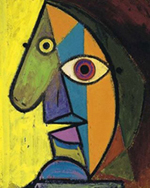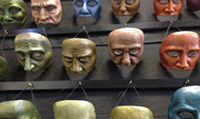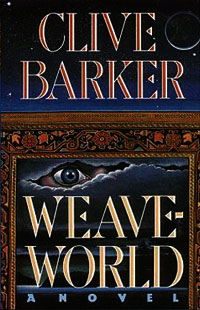Neptune has been retrograde since early June, and goes direct today. Here is a reprise of a favorite Neptune post. It's worth a second read, as Neptune remains in Pisces until March 30, 2025.
“Valley’s deep and the mountain’s so high / If you want to see God you’ve got to move on the other side.”—John Lee
On Friday, February 3, 2012, Neptune entered Pisces for the next 13 years.
In my first piece last spring about Neptune’s move into Pisces ("Home I'll Be"), I focused on Neptune’s longings, and how imagination allows us to see and experience the world as something miraculous. Since I didn’t go into much detail about actually doing that, I want to pick up where that piece left off. How does imagination fit into this? What do we do when Neptune seems to call us away from the world in which we live, into a world of fantastic imaginings, heightened longings, poignant nostalgias, or a sense that what we’re dealing with in the practical world just isn’t satisfying? If Neptune is associated with “escapism,” does that mean there’s something fishy about the imagination? Let’s dive in and see!
LA MER
Neptune is named after the god of the seas, so let’s start with the biggest seas of them all: the oceans. Neptune in astrology is oceanic. It’s epic, vast, expansive, enveloping, and seductive. If we look at earth itself, 71% of the planet is covered and filled by oceans, and the oceans are teeming with colorful, diverse and abundant life. From enormous, elegant blue whales to microscopic plankton, intriguing orange sea horses to mysterious pink jellyfish, yellow starfish to great white sharks, giant green turtles to lean swordfish. We find octopi that shoot black ink when under threat, and cute poisonous puffers (“blowfish”) that inflate themselves and show their pointy bits when in danger. All of these finned and gilled beings weave in and out of the constantly shifting waterscape, sometimes making their way through the occasional remains of ships lost at sea, those vessels wracked and wrecked by violent and stormy waves, their crews and treasures buried indefinitely among the pastel and fluorescent-colored coral reefs, the turquoise, teal, and other moody blues of the deep-sea trenches.
Note: virtually all of this happens beneath the surface.
The oceans of earth are as violent as they are serene, as tumultuous as they are tranquil, and as dangerous as they are alluring. In trying to imagine all they contain, our minds and visions are stretched far and wide, high and low. And there’s so much water! “Your ocean is an image of eternity, I think,” said Queen Elizabeth to Walter Raleigh in the movie “Elizabeth: The Golden Age.” Amidst all of this visionary majesty, what’s a little land-locked mortal to do? Combine that with William Blake’s classic statement, “The world of Imagination is the world of Eternity.” And Novalis, who believed that “eternity could be reached through imagination and imagination was the realm of poetry.” Which brings us to one of the key archetypes of both Neptune and Pisces...
THE POET ARCHETYPE
With Neptune in Pisces, we have the opportunity to perceive the world as if we are all great poets. For centuries and centuries, great poets have been peering at the everyday world through symbolic eyes, painting pictures with words, bringing figures of speech to life, and sculpting metaphors that link the physical world in front of us with the magical and animated world of the imagination, turning concepts into art. It’s as if every individual thing in the world becomes 71% ocean, full of colorful, animated life swimming beneath its surface. Life comes alive! For Emily Dickinson, hope was not just an idea – it was “the thing with feathers.” Hope has wings to fly! For William Wordsworth we aren’t just born into the world as ordinary babies; rather, “trailing clouds of glory do we come.” For Hafiz, a leaf is not just a leaf, but rather “a singing cleaning woman, dusting all the shelves in the air” with her elegant green rags. Through imagination, life isn’t just “business as usual,” unless business as usual is a trip down the Yellow Brick Road, replete with witches, talking trees, poppy fields, flying monkeys and an Emerald City up ahead. To connect the ordinary world with its roots in imagination, as Poets do, is one of Neptune’s gifts. It doesn’t make sense, and it’s not really supposed to. As the great 19th century Romantic poet John Keats put it, “Poetry soothes and emboldens the soul to accept the mystery.”
Speaking of Keats, one of his most famous lines can help us expand on this connection between the ordinary, natural world, and the fantastic world of imagination. In one of his letters he writes, “Call the world if you please ‘The vale of soul-making’ Then you will find out the use of the world.” Let this be our Neptunian bridge, connecting the imagination and the world around us.
SOUL
To call the world the “vale of soul-making” first requires us to acknowledge the world. This can be tough when the Siren’s call of Eternity enchants us elsewhere, pulling us to some unseen home away from home. Yet, here we all are. Here we are, amidst the deep valleys, rocky mountains, expansive prairies; underneath ever-changing clouds, skies of blue and pink and purple and red and black; alongside insects, countless trees, rolling hills, city sidewalks, glass windows; and immersed in chirping, tweeting (not that kind), barking, cawing, mooing, purring, honking, and howling. How does this life in the valley called earth “make” soul? With the soul’s influence via Neptune, skyscrapers can heighten our senses, valleys can depress our everyday lives into deeper feeling, the friendly skies can expand our sights, and those sidewalks can encourage our wanderings.
Where Keats calls the world the vale of soul-making, poet Mary Oliver writes that “the world offers itself to your imagination / calls to you like the wild geese, harsh and exciting.” Rather than follow Neptune’s call away from this world, we need only engage with this world through the imagination—the world calls us and we call the world in mutual response, engaging the soul of it all. Our vocation, our calling, is to live. We are called to live, and life calls us. Engaging with the world via the imagination is about feeling the world, seeing its signs and wonders, hearing its voices, seeing its imagery, touching the world and letting the world touch you. The soul speaks in symbols, images and signs, and the world is packed-to-overflowing with soul. To engage Neptune in Pisces within this world is to engage the soul of the world.
Later in the 19th century another of those great poets, Alfred Lord Tennyson, wrote, “For so the whole round earth is every way / Bound by gold chains about the feet of God.” Now there’s an image!
NEPTUNE AND OIL
In astrology, Neptune “rules” oil. This typically means that Neptune transits can reflect oil issues in some way, be it oil prices, oil dependency, etc. In a different way, perhaps—keeping the poetic eye intact—we might say that imagination is the oil of the psyche. Imagination is what keeps the gears of the psyche turning, visioning, wondering, enchanting, imaging. Imagination keeps the engines of life moving, spinning an endless array of creative visions that fashion the world around us, and create the cultural fashions that Neptune also rules.
Ancient Greek culture considered the heart the center of imagination. Without imagination, the world becomes only literal, what you see is what you get; nothing more, nothing less. Boring! Without imagination, we end up like the Tin Man, fixed and immobile on the winding and circling Yellow Brick Road of life, cranky and creaky, waiting for someone to come along and oil our stuck joints, to once again give us flexibility to bend and curve where and when necessary, and to give us a heart.
Neptune changing signs is like a global oil change. The images that keep our gears turning are changing. When Neptune moved through Aquarius we all experienced the heady, technical genius of the Internet connecting us all together; we saw the technology and special effects in movies explode into unprecedented HD clarity and complexity; and we saw talent bloom on “reality” shows along with some of the colder and less compassionate aspects of humanity. With Neptune in Pisces we’ll likely see the images soften a bit. Lady Antebellum sings in their beautiful song “The Heart of the World,” that “oil is the soul of the engine / ... love is the heart of the world.” Neptunian love is compassion, and Neptune in Pisces can bring out the compassionate side of humanity in new ways, especially as we are consciously connected as a globe like never before.
THE INVISIBLE BRIDGE
Poets take a decidedly Neptunian view of the world, via the imagination. I’ve quoted a number of poets in this piece to emphasize the link between the poet’s vision and imagination, and to steer imagination far and away from the notion that it’s something merely “made up.” Poets connect the natural world and the imaginal world seamlessly. They devise poems with metaphor, and metaphor means “to carry over.” Neptune is the invisible bridge that allows us to carry over the images of imagination into physical form. What images are you carrying over? What’s in your imagination?
Another of Tennyson’s famous lines reads, “The old order changeth, yielding place to new.” Remember from my first piece last spring that all new life emerges from water. With Neptune’s waters washing through Pisces between now and 2024, our imaginings of a new world can become tangible, and we can embrace a truly enchanted view of an alive life, a renewed life, where “once upon a time” is now, and where “somewhere over the rainbow” is here. We can sense the extraordinary beauty and other-worldly grace that makes life down here in the valley, right here and right now in this world, quite marvelous, really. Here’s to water, and here’s to life!














